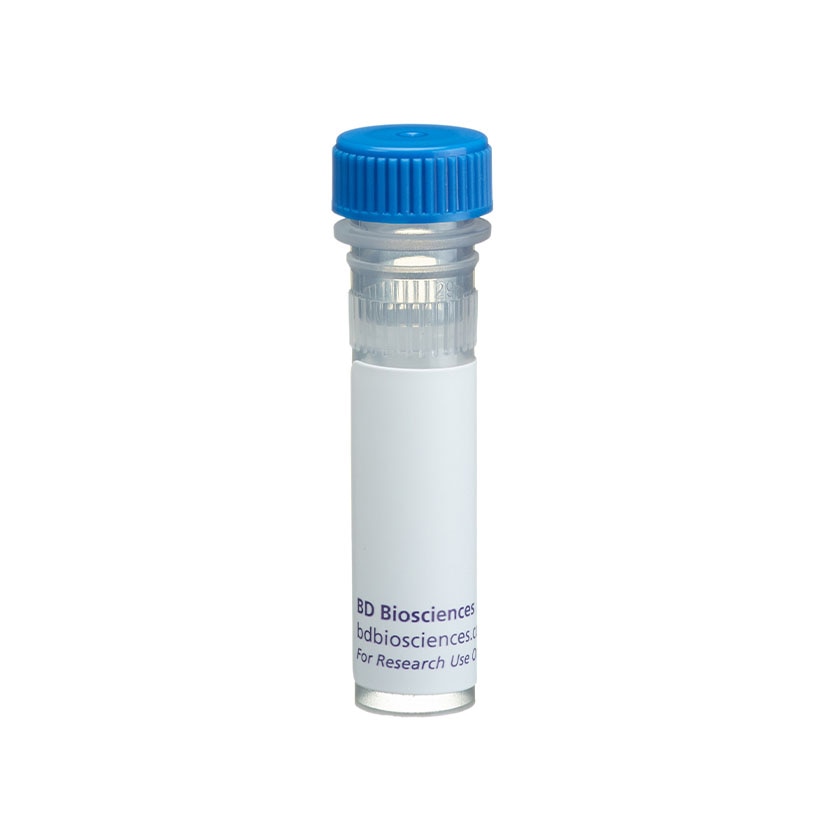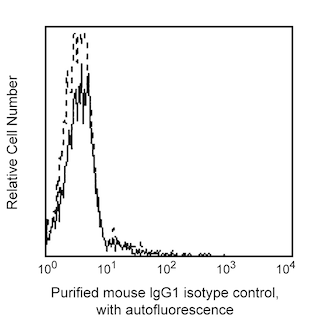Old Browser
This page has been recently translated and is available in French now.
Looks like you're visiting us from {countryName}.
Would you like to stay on the current country site or be switched to your country?




Profile of TPA+Ca++ Ionophore-stimulated PBMCs analyzed on a FACScan (BDIS, San Jose, CA)


BD Pharmingen™ Purified Mouse Anti-Human CD154

Regulatory Status Legend
Any use of products other than the permitted use without the express written authorization of Becton, Dickinson and Company is strictly prohibited.
Preparation And Storage
Product Notices
- Since applications vary, each investigator should titrate the reagent to obtain optimal results.
- Please refer to www.bdbiosciences.com/us/s/resources for technical protocols.
- Caution: Sodium azide yields highly toxic hydrazoic acid under acidic conditions. Dilute azide compounds in running water before discarding to avoid accumulation of potentially explosive deposits in plumbing.
Companion Products

.png?imwidth=320)
The TRAP1 monoclonal antibody specifically binds to CD154. CD154 is a 39 kDa type II membrane glycoprotein that is a member of the tumor necrosis factor superfamily, Tumor necrosis factor ligand superfamily member 5 (TNFSF5). CD154 is expressed on a variety of cell types including activated CD4+ T cells and some CD8+ T cells, NK cells, mast cells and basophils. CD154 is also known as CD40 ligand (CD40L); it serves as a ligand for CD40 that is expressed on B cells, macrophages, and dendritic cells. The expression of CD154 by activated T-helper cells costimulates B-cell activation and proliferation through binding to CD40 expressed on B cells. In response to T-dependent antigens, the CD154 and CD40 interaction is required for B-lymphocyte differentiation, including immunoglobulin production and isotype switching and memory B cell generation. The TRAP1 antibody can partially block T cell-B cell interaction and inhibit the subsequent proliferation, differentiation, and memory formation of B cells. It has been reported that patients with X-linked hyper-IgM syndrome have defective expression of functional CD154 due to mutations in the CD40LG gene that encodes CD154.
This antibody is routinely tested by flow cytometric analysis. Other applications were tested at BD Biosciences Pharmingen during antibody development only or reported in the literature.
Development References (6)
-
Fuleihan R, Ramesh N, Horner A, et al. Cyclosporin A inhibits CD40 ligand expression in T lymphocytes. J Clin Invest. 1994; 93(3):1315-1320. (Biology). View Reference
-
Gray D, Dullforce P, Jainandunsing S. Memory B cell development but not germinal center formation is impaired by in vivo blockade of CD40-CD40 ligand interaction. J Exp Med. 1994; 180(1):141-155. (Biology). View Reference
-
Kishimoto T. Tadamitsu Kishimoto .. et al., ed. Leucocyte typing VI : white cell differentiation antigens : proceedings of the sixth international workshop and conference held in Kobe, Japan, 10-14 November 1996. New York: Garland Pub.; 1997.
-
Mason D. David Mason .. et al., ed. Leucocyte typing VII : white cell differentiation antigens : proceedings of the Seventh International Workshop and Conference held in Harrogate, United Kingdom. Oxford: Oxford University Press; 2002.
-
Nishioka Y, Lipsky PE. The role of CD40-CD40 ligand interaction in human T cell-B cell collaboration. J Immunol. 1994; 153(3):1027-1036. (Biology). View Reference
-
van Kooten C, Gaillard C, Galizzi JP, et al. B cells regulate expression of CD40 ligand on activated T cells by lowering the mRNA level and through the release of soluble CD40. Eur J Immunol. 1994; 24(4):787-792. (Biology). View Reference
Please refer to Support Documents for Quality Certificates
Global - Refer to manufacturer's instructions for use and related User Manuals and Technical data sheets before using this products as described
Comparisons, where applicable, are made against older BD Technology, manual methods or are general performance claims. Comparisons are not made against non-BD technologies, unless otherwise noted.
For Research Use Only. Not for use in diagnostic or therapeutic procedures.
Report a Site Issue
This form is intended to help us improve our website experience. For other support, please visit our Contact Us page.